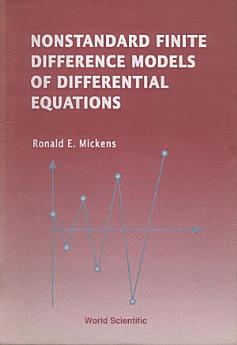Nonstandard Finite Difference Models Of Differential Equations
ডিচে ১৯৯৩ · World Scientific
ইবুক
264
পৃষ্ঠা
family_home
যোগ্য
info
reportমূল্যাংকন আৰু পৰ্যালোচনা সত্যাপন কৰা হোৱা নাই অধিক জানক
এই ইবুকখনৰ বিষয়ে
This book provides a clear summary of the work of the author on the construction of nonstandard finite difference schemes for the numerical integration of differential equations. The major thrust of the book is to show that discrete models of differential equations exist such that the elementary types of numerical instabilities do not occur. A consequence of this result is that in general bigger step-sizes can often be used in actual calculations and/or finite difference schemes can be constructed that are conditionally stable in many instances whereas in using standard techniques no such schemes exist. The theoretical basis of this work is centered on the concepts of “exact” and “best” finite difference schemes. In addition, a set of rules is given for the discrete modeling of derivatives and nonlinear expressions that occur in differential equations. These rules often lead to a unique nonstandard finite difference model for a given differential equation.
এই ইবুকখনক মূল্যাংকন কৰক
আমাক আপোনাৰ মতামত জনাওক।
পঢ়াৰ নির্দেশাৱলী
স্মাৰ্টফ’ন আৰু টেবলেট
Android আৰু iPad/iPhoneৰ বাবে Google Play Books এপটো ইনষ্টল কৰক। ই স্বয়ংক্রিয়ভাৱে আপোনাৰ একাউণ্টৰ সৈতে ছিংক হয় আৰু আপুনি য'তে নাথাকক ত'তেই কোনো অডিঅ'বুক অনলাইন বা অফলাইনত শুনিবলৈ সুবিধা দিয়ে।
লেপটপ আৰু কম্পিউটাৰ
আপুনি কম্পিউটাৰৰ ৱেব ব্রাউজাৰ ব্যৱহাৰ কৰি Google Playত কিনা অডিঅ'বুকসমূহ শুনিব পাৰে।
ই-ৰীডাৰ আৰু অন্য ডিভাইচ
Kobo eReadersৰ দৰে ই-চিয়াঁহীৰ ডিভাইচসমূহত পঢ়িবলৈ, আপুনি এটা ফাইল ডাউনল’ড কৰি সেইটো আপোনাৰ ডিভাইচলৈ স্থানান্তৰণ কৰিব লাগিব। সমৰ্থিত ই-ৰিডাৰলৈ ফাইলটো কেনেকৈ স্থানান্তৰ কৰিব জানিবলৈ সহায় কেন্দ্ৰত থকা সবিশেষ নিৰ্দেশাৱলী চাওক।








